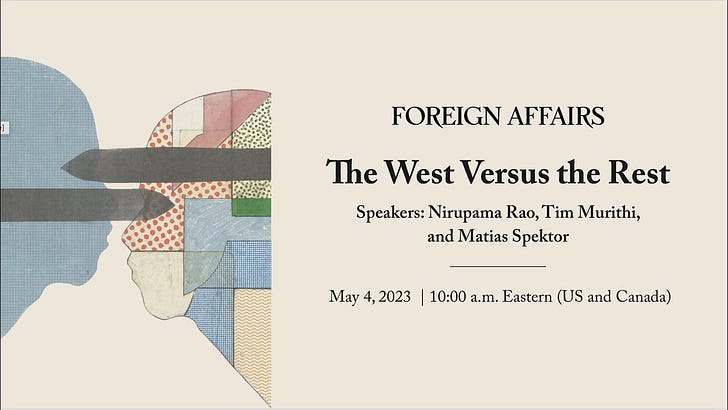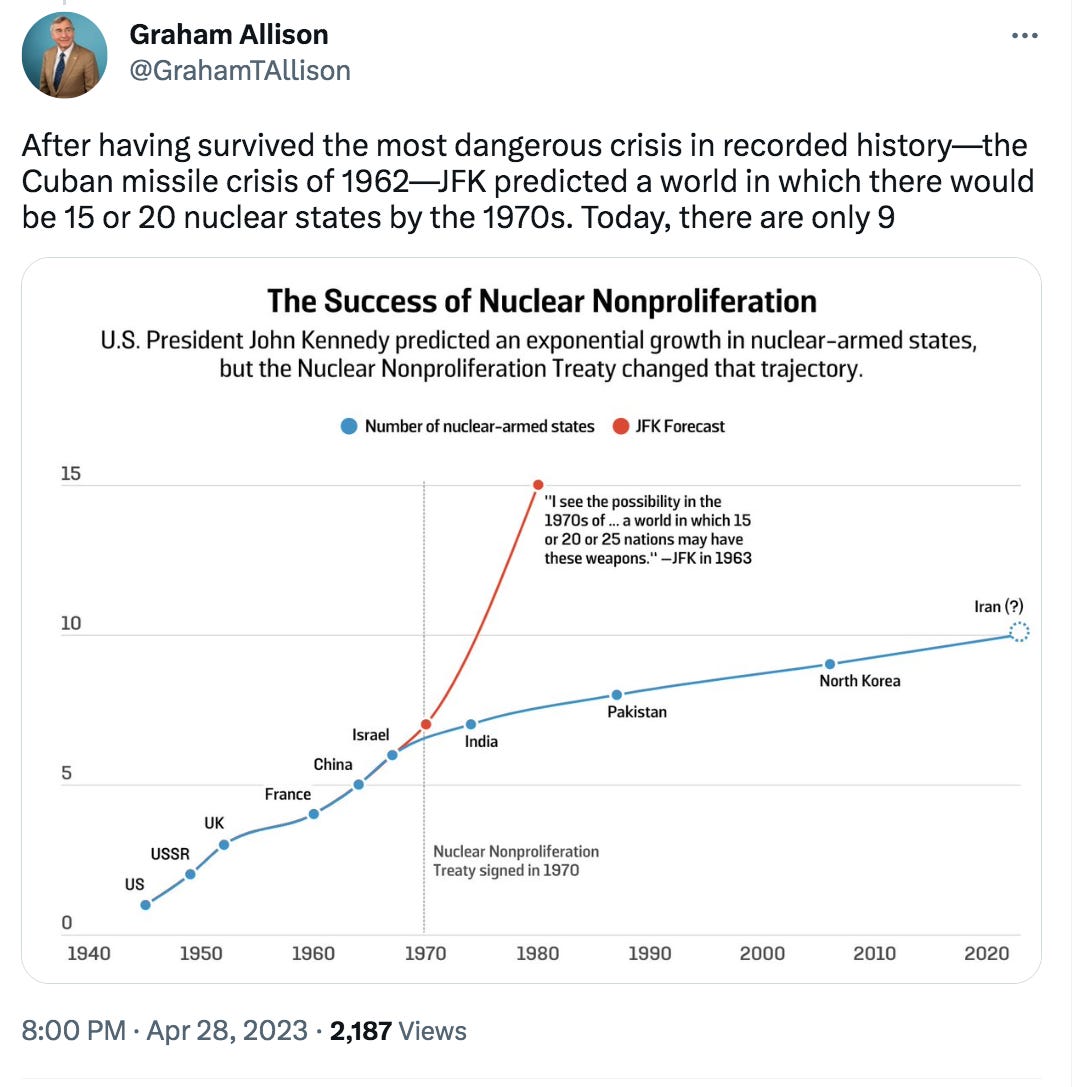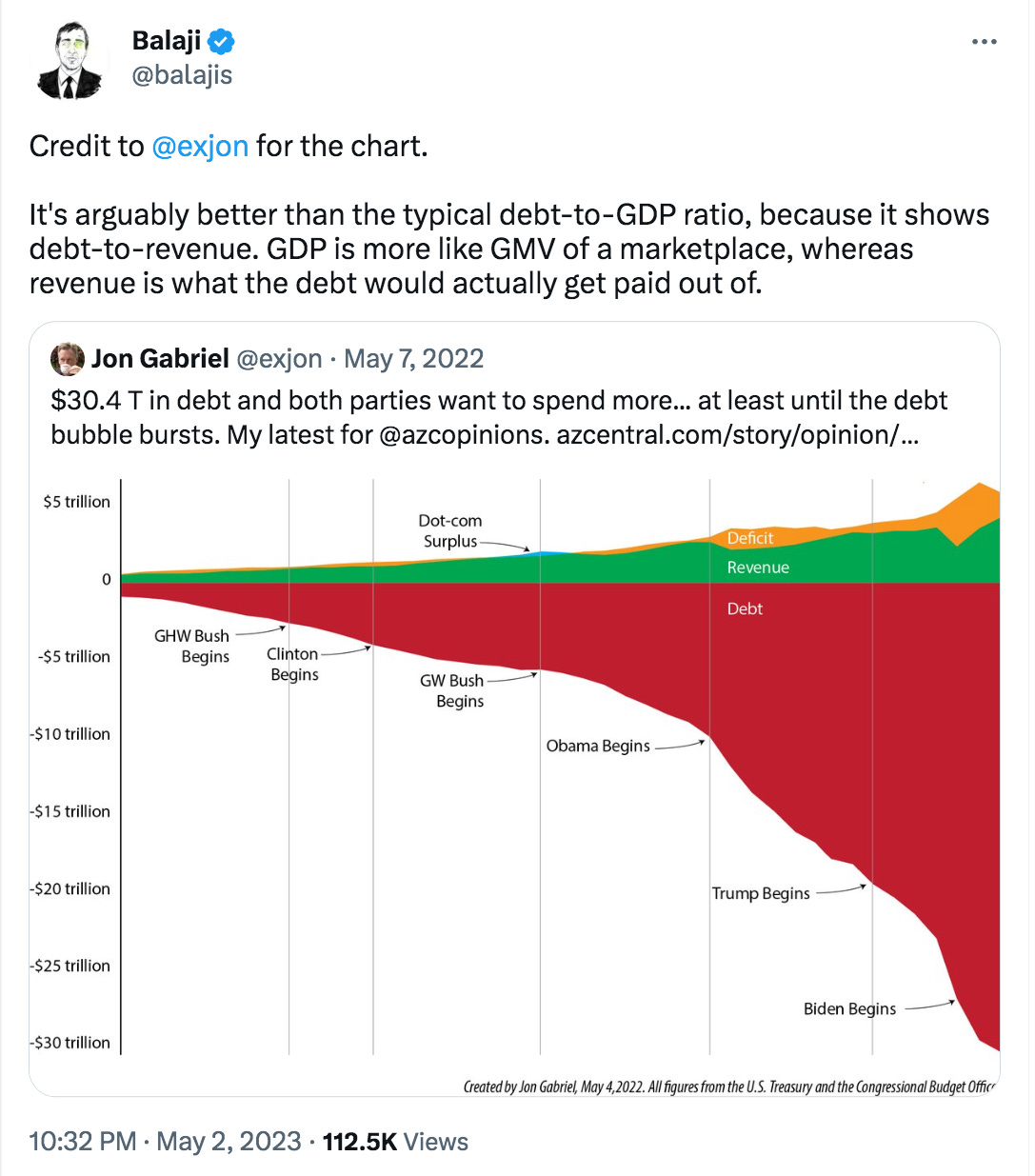Digest 18: an American Foreign Legion?; listening to BRICS; success of non-proliferation
The most interesting things I’ve come across, in the past two weeks…
Listening to BRICS
I found the following a really good discussion – Foreign Affairs commendably endeavouring to get out of ‘Western bubble’ thinking.
The magazine’s Executive Editor speaks with an Indian Ambassador, and South African and Brazilian academics, to get their (candid) views on American foreign policy.
This is not a typical Council on Foreign Relations discussion. There is prolonged talk of ‘American amnesia’ and hypocrisy.
It will bring any watcher closer to a 360º view of how the world is thinking about Ukraine.
The possibility of the U.S. and China mediating together in Ukraine
From the Washington Post:
When I asked Blinken about working with China to achieve a stable outcome in Ukraine, he gave a surprisingly frank answer: “In principle, there’s nothing wrong with that if we have a country, whether it’s China or other countries that have significant influence that are prepared to pursue a just and durable peace… We would welcome that, and it’s certainly possible that China would have a role to play in that effort. And that could be very beneficial.”
This might be naïve, but surely if both the U.S. and China were to have a hand in a negotiated outcome, it would stand a better chance of resulting long-term stability.
The success of non-proliferation
I found this timeline marginally uplifting, from Graham Allison:
‘One of the greatest achievements of US national security strategy: its decadeslong success in preventing the proliferation of nuclear weapons’
An American Foreign Legion?
I spent time this week reading about the French Foreign Legion.
I knew nothing about it.
In short: former criminals and people who want to escape their past the world over travel to France, hand in their passports, pledge allegiance to the French military (and commit to five years of full-time service), go through rather brutal military selection/training, and then get put on the front line of combat – while getting paid (relatively from poorer countries) quite well.
8,000 people travel to France to try out for the Legion’s selection every year. And French Foreign Legion members consist of 140+ nationalities.
(You don’t need to watch it, but for anyone sufficiently interested, I found this video the best overview.)
This led me to read this piece by Ray Vawter on the idea for an American Foreign Legion.
If Trump were to take back the White House – which looks ever more likely with each passing week – he’s likely going to continue ‘bringing American troops home’.
Could a U.S. Foreign Legion allow him to do so – without diminishment of credible deterrence?
It’s a bit of a wacky idea. But is it a bad one?
American military recruiters are struggling right now (clip for 15 seconds):
And if the U.S. were to pull out more of its forward-deployed troops, it would potentially be globally destabilising.
Could an American Foreign Legion allow for a sane mid-point between historic interventionism and isolationism?
It could allow the U.S. to continue to commit some force worldwide where it wants, without political backlash at home.
To immediate critics: I wouldn’t consider this ‘taking advantage of people’ in an inhumane way. Application to it would of course be voluntary. And spend a few hours watching videos and interviews with French Foreign Legion soldiers. They desperately want to be there!
Give people who make it through X number of years (legal) American residency/citizenship.
Any soldier who is wounded during a battle for France can immediately apply to be a French citizen under a provision known as “Français par le sang versé” (“French by spilled blood”).
This would doubtless be an out of left field policy. But I don’t think it’s a terrible idea.
Jared Kushner on negotiating peace deals in the Middle East
How does a businessperson with no diplomatic experience approach peace-brokering?
Fascinating clip (~5 minutes):
My former boss in government, Dominic Cummings:
I strongly recommend Jared Kushner’s book, Breaking History. It’s an unusual DC memoir. It makes a strong case for Trump’s successes, such as progress with Middle East peace by doing things very strongly against the conventional wisdom of the foreign policy bureaucracies.
I’m presently finishing reading a book on George Marshall’s failed attempt to negotiate peace between Mao and Chiang Kai-Shek at the outset of the Chinese Civil War. This will be next on my reading list.
Balaji – the best of his recent Twitter
Staying strong in his assessment of the precariousness of U.S. government finances, and the dollar…
This 2-minute clip with Janet Yellen is mildly terrifying
Internal Fed report that ‘722 banks report unrealized losses exceeding 50% of capital’
FDIC meeting video, November 2022, in which decision makers deliberate withholding information on bank health, so as not to alarm the public
Many people have told me Balaji is ‘just a Bitcoin shill’. But in the above he’s citing U.S. Gov sources.
Debt to government revenue graph:
And lastly on the potential for de-dollarisation:
They aren’t the good guys, but Russia… seemingly managed to transition away many functions from the dollar to the yuan in one year, in the middle of a war, without completely wrecking their economy. So this shows that de-dollarization can happen very fast if a state decides to do it. Even countries that don’t like Russia know that a playbook exists.
Multifaith Britain
From a Spectator leading article…
When Prince Charles declared in 1994 that he wished to be seen as the ‘defender of faith’ rather than just the Defender of the Faith, he caused controversy. But his coronation will bear out the wisdom of his earlier comment.
There will be a reading from Rishi Sunak, a Hindu. Also in attendance will be the Home Secretary, a Buddhist; the mayor of London, a Muslim; and Humza Yousaf, the First Minister of Scotland and the first Muslim to lead any western European country. The Chief Rabbi and his wife will walk to Westminster Abbey from Buckingham Palace where they are staying as guests of the King, who was mindful that if they travelled by car they’d be breaking the Sabbath.
It’s a measure of Britain’s instinctive tolerance that almost no one thinks this strange.
Britain is all the stronger for its tolerance, and for absorbing all religions in an atmosphere of free and open worship.
Religion is no bar to holding the highest public offices here, and nor is race.
Who would Trump make his Vice?
From the person who arguably knows him most closely in the UK (10 second clip)…
*
Thank you for reading. If you got something out of this, please share it with one person you know who might benefit from it.





